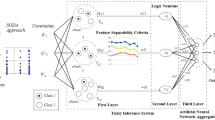Abstract
An approach to apply ensembles of genetic fuzzy systems, built over the chunks of a data stream, to aid in residential premises valuation was proposed. The approach consists in incremental expanding an ensemble by systematically generated models in the course of time. The output of aged component models produced for current data is updated according to a trend function reflecting the changes of premises prices since the moment of individual model generation. An experimental evaluation of the proposed method using real-world data taken from a dynamically changing real estate market revealed its advantage in terms of predictive accuracy.
Access this chapter
Tax calculation will be finalised at checkout
Purchases are for personal use only
Preview
Unable to display preview. Download preview PDF.
Similar content being viewed by others
References
Alonso, J.M., Magdalena, L., González-Rodríguez, G.: Looking for a good fuzzy system interpretability index: An experimental approach. International Journal of Approximate Reasoning 51, 115–134 (2009)
Angelov, P.P., Filev, D.: An approach to online identification of Takagi-Sugeno fuzzy models. IEEE Transactions on Systems, Man and Cybernetics, part B 34(1), 484–498 (2004)
Breiman, L.: Bagging Predictors. Machine Learning 24(2), 123–140 (1996)
Brzeziński, D., Stefanowski, J.: Accuracy Updated Ensemble for Data Streams with Concept Drift. In: Corchado, E., Kurzyński, M., Woźniak, M. (eds.) HAIS 2011, Part II. LNCS (LNAI), vol. 6679, pp. 155–163. Springer, Heidelberg (2011)
Bühlmann, P., Yu, B.: Analyzing bagging. Annals of Statistics 30, 927–961 (2002)
Castro, J.L., Delgado, M.: Fuzzy systems with defuzzification are universal approximators. IEEE Transactions on System, Man and Cybernetics 26, 149–152 (1996)
Cordón, O., Gomide, F., Herrera, F., Hoffmann, F., Magdalena, L.: Ten years of genetic fuzzy systems: current framework and new trends. Fuzzy Sets and Systems 141, 5–31 (2004)
Cordón, O., Herrera, F.: A Two-Stage Evolutionary Process for Designing TSK Fuzzy Rule-Based Systems. IEEE Tr. on Sys., Man, and Cyb.-Part B 29(6), 703–715 (1999)
Elwell, R., Polikar, R.: Incremental Learning of Concept Drift in Nonstationary Environments. IEEE Transactions on Neural Networks 22(10), 1517–1531 (2011)
Fumera, G., Roli, F., Serrau, A.: A theoretical analysis of bagging as a linear combination of classifiers. IEEE Transactions on Pattern Analysis and Machine Intelligence 30(7), 1293–1299 (2008)
Gaber, M.M.: Advances in data stream mining. Wiley Interdisciplinary Reviews: Data Mining and Knowledge Discovery 2(1), 79–85 (2012)
Kempa, O., Lasota, T., Telec, Z., Trawiński, B.: Investigation of Bagging Ensembles of Genetic Neural Networks and Fuzzy Systems for Real Estate Appraisal. In: Nguyen, N.T., Kim, C.-G., Janiak, A. (eds.) ACIIDS 2011, Part II. LNCS (LNAI), vol. 6592, pp. 323–332. Springer, Heidelberg (2011)
Kosko, B.: Fuzzy systems as universal approximators. IEEE Transactions on Computers 43(11), 1329–1333 (1994)
Król, D., Lasota, T., Trawiński, B., Trawiński, K.: Investigation of Evolutionary Optimization Methods of TSK Fuzzy Model for Real Estate Appraisal. International Journal of Hybrid Intelligent Systems 5(3), 111–128 (2008)
Król, D., Szymański, M., Trawiński, B.: The recommendation mechanism in an internet information system with time impact coefficient. International Journal of Computer Science Applications 3(2), 65–80 (2006)
Kuncheva, L.I.: Classifier Ensembles for Changing Environments. In: Roli, F., Kittler, J., Windeatt, T. (eds.) MCS 2004. LNCS, vol. 3077, pp. 1–15. Springer, Heidelberg (2004)
Lasota, T., Telec, Z., Trawiński, B., Trawiński, K.: Investigation of the eTS Evolving Fuzzy Systems Applied to Real Estate Appraisal. Journal of Multiple-Valued Logic and Soft Computing 17(2-3), 229–253 (2011)
Lasota, T., Telec, Z., Trawiński, G., Trawiński, B.: Empirical Comparison of Resampling Methods Using Genetic Fuzzy Systems for a Regression Problem. In: Yin, H., Wang, W., Rayward-Smith, V. (eds.) IDEAL 2011. LNCS, vol. 6936, pp. 17–24. Springer, Heidelberg (2011)
Lughofer, E., Trawiński, B., Trawiński, K., Kempa, O., Lasota, T.: On Employing Fuzzy Modeling Algorithms for the Valuation of Residential Premises. Information Sciences 181, 5123–5142 (2011)
Lughofer, E.: Evolving Fuzzy Systems – Methodologies, Advanced Concepts and Applications. STUDFUZZ, vol. 266. Springer, Heidelberg (2011)
Lughofer, E.: FLEXFIS: A robust incremental learning approach for evolving TS fuzzy models. IEEE Transactions on Fuzzy Systems 16(6), 1393–1410 (2008)
Maloof, M.A., Michalski, R.S.: Incremental learning with partial instance memory. Artificial Intelligence 154(1-2), 95–126 (2004)
Minku, L.L., White, A.P., Yao, X.: The Impact of Diversity on Online Ensemble Learning in the Presence of Concept Drift. IEEE Transactions on Knowledge and Data Engineering 22(5), 730–742 (2010)
Schapire, R.E.: The strength of weak learnability. Mach. Learning 5(2), 197–227 (1990)
Tsymbal, A.: The problem of concept drift: Definitions and related work. Technical Report. Department of Computer Science, Trinity College, Dublin (2004)
Wang, H., Fan, W., Yu, P.S., Han, J.: Mining concept-drifting data streams using ensemble classifiers. In: Getoor, L., et al. (eds.) KDD 2003, pp. 226–235. ACM Press (2003)
Widmer, G., Kubat, M.: Learning in the presence of concept drift and hidden contexts. Machine Learning 23, 69–101 (1996)
Wolpert, D.H.: Stacked Generalization. Neural Networks 5(2), 241–259 (1992)
Zliobaite, I.: Learning under Concept Drift: an Overview. Technical Report. Faculty of Mathematics and Informatics. Vilnius University, Vilnius (2009)
Author information
Authors and Affiliations
Editor information
Editors and Affiliations
Rights and permissions
Copyright information
© 2012 Springer-Verlag Berlin Heidelberg
About this paper
Cite this paper
Trawiński, B., Lasota, T., Smętek, M., Trawiński, G. (2012). An Attempt to Employ Genetic Fuzzy Systems to Predict from a Data Stream of Premises Transactions. In: Hüllermeier, E., Link, S., Fober, T., Seeger, B. (eds) Scalable Uncertainty Management. SUM 2012. Lecture Notes in Computer Science(), vol 7520. Springer, Berlin, Heidelberg. https://doi.org/10.1007/978-3-642-33362-0_10
Download citation
DOI: https://doi.org/10.1007/978-3-642-33362-0_10
Publisher Name: Springer, Berlin, Heidelberg
Print ISBN: 978-3-642-33361-3
Online ISBN: 978-3-642-33362-0
eBook Packages: Computer ScienceComputer Science (R0)




